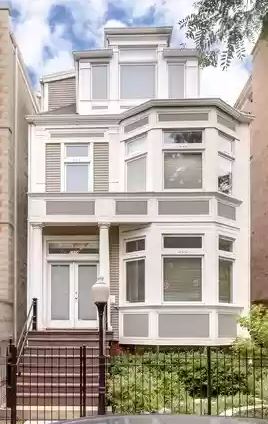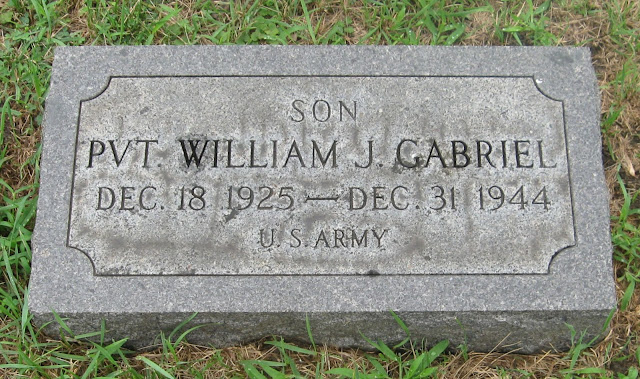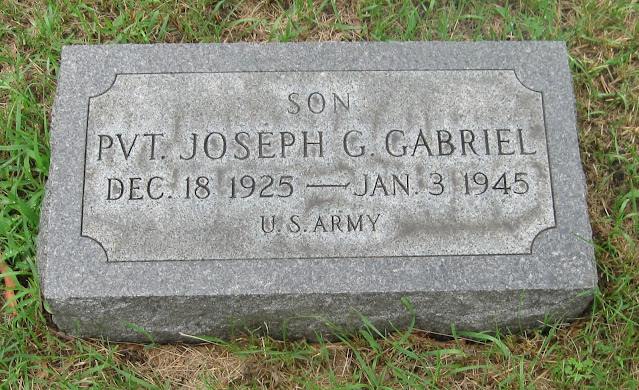I was recently at Acacia Park Cemetery in Chicago filling a Find a Grave photo request (what else is new?). The person had requested a photo of the grave of William G. Gabriel, who is buried in the Willow Section. I found it without any problem:

Then I saw the tombstones for two of his sons:
I noticed that they were twins - both born on the same day - December 18, 1925. But then I noticed they had died just days apart - William on December 31, 1944 and Joseph on January 3, 1945. I figured it was just a sad coincidence that they had both been killed in combat around the same time. In that I was incorrect. However, I felt there must be an interesting story here and in that I was right. Before we look at the tragedy that took the lives of Joseph and William let's take a look at their family and their lives before the war.
Joseph Glen Gabriel and William Jackson "Jack" Gabriel were born in Chicago on December 18, 1925. Their parents were William Glenn Gabriel (1905-1990) and Georgianna Moore Gabriel (1901-1993). William and Georgianna were married in Missouri in 1925. In addition to the twins, they had four other children: Dale G. (b. 1931), Harry Donald (1934-2007), Annalee Joy (1936-2011), and Coralee June (b. 1941). William Glen Gabriel was a mechanic by trade.
The first time we encounter the twins is in the 1930 US Census. The family was living at 2513 Lowell Avenue in Chicago:
 |
| 2513 N. Lowell Avenue, Chicago, Illinois |
The family consisted of William G. (25 years old), Georgia (28), and the twins (4). They were renting, and their apartment cost $30.00 per month. Neither William nor Georgia were employed (it was during the Great Depression).
By the time of the 1940 US Census the family had changes significantly. They were now living at 1122 W. Drummond Place in Chicago:
 |
| 1122 W. Drummond, Chicago |
The family now consists of William (35 years-old), Georgia (38), twins Jack and Joseph (14), Dale (8), Donald (5), and Annalee (3). They are renting their apartment for $22.00 per month. William is working as a "Mechanic in a Garage."
Jack and Joseph Gabriel registered for the draft on December 20, 1943, right after they turned eighteen. They both indicated that they were living at home with their parents. Home was now 1114 W. Wrightwood Avenue in Chicago:
 |
| 1114 W. Wrightwood Avenue, Chicago |
They were both working for their father, who now owned a Service Station: Gabriel Service Station, 7200 W. Addison in Chicago. Surprisingly it is still a Service Station but they no longer sell gasoline:
 |
| 7200 W. Addison, Chicago |
Joseph was 5' 9" tall, weighed 178 lbs., had brown eyes and black hair with a ruddy complexion. In addition, he wore glasses.
Jack was 6' tall, weighed 185 lbs., and (surprise) also had brown eyes, black hair, a ruddy complexion and also wore glasses.
After they both graduated from Lane Technical High School in June of 1944 the entered the US Army.
So, how, where and when did the Gabriel twins die? Surprisingly since it was wartime, they did not die in combat. They tragically died in Utah's worst train wreck - an accident that killed a total of fifty people - including twenty-nine military personnel and nine railroad workers.
Here's the front page of the Salt Lake Tribune from January 1, 1945:
At the site of the crash, the tracks run along a causeway across desolate mud and shallow water, so all rescue efforts had to come by rail. Two hospital cars were included in the 1st train manned by members of the Medical Corps and tended the injured until rescue trains arrived from Ogden.
The official inquiry into the accident concluded 'this accident was caused by failure to properly control the speed of the following train in accordance with signal indications.' The 1st train had seen the two preceding stop signals and its engineers were preparing to halt when that train was struck by the 2nd train. After the fireman on the 2nd train missed the first stop signal due to heavy fog, he reported the missed signal to the engineer; the fireman then saw the second stop signal and relayed it to the engineer, but did not witness the engineer of the 2nd train respond by slowing the train. Most of the crew of the 2nd train were resting in the rearmost car and were not aware of any issues until the brakes were applied, approximately 12 seconds before the collision. Both the engineer of the second train and the flagman of the 1st train were killed.
Although the engineer of the 2nd train had applied the brakes, the position in which he was found indicated that he had been incapacitated prior to the collision. A coroner's inquest concluded the engineer had died from sudden shock or heart failure just before the crash.
The Gabriel family back in Chicago was notified by the War Department that Pvt. William J. Gabriel had died at Bushnell Hospital, Brigham City, Utah and that his twin brother Joseph was seriously injured and at the Reno Army Air Base Hospital. Their father immediately left for Utah and Nevada.
The Reno (NV) Evening Gazette reported in their January 4, 1945 edition:
Here is William's Death Certificate:
The Chicago Tribune of course reported on the wreck in their January 1, 1945 edition:

Here are their Death Notices from the Chicago Tribune of January 6, 1945:












So sad! Thank you for researching and sharing their story.
ReplyDelete